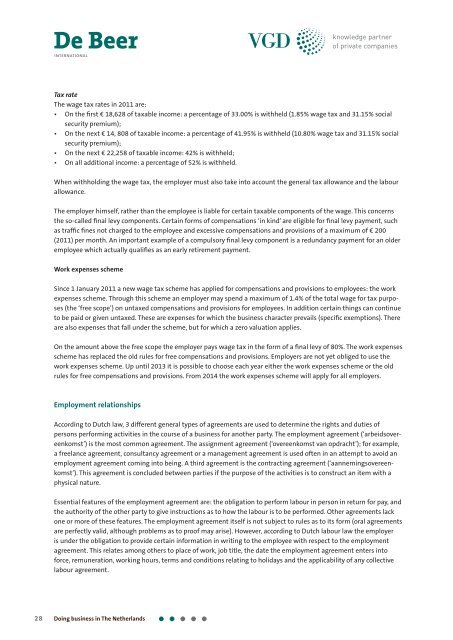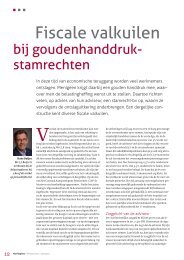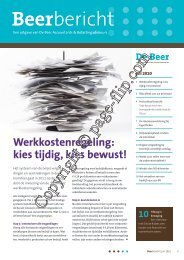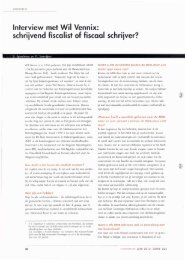De Beer
De Beer
De Beer
- No tags were found...
Create successful ePaper yourself
Turn your PDF publications into a flip-book with our unique Google optimized e-Paper software.
<strong>De</strong> <strong>Beer</strong>INTERNATIONALknowledge partnerof private companiesTax rateThe wage tax rates in 2011 are:• On the first € 18,628 of taxable income: a percentage of 33.00% is withheld (1.85% wage tax and 31.15% socialsecurity premium);• On the next € 14, 808 of taxable income: a percentage of 41.95% is withheld (10.80% wage tax and 31.15% socialsecurity premium);• On the next € 22,258 of taxable income: 42% is withheld;• On all additional income: a percentage of 52% is withheld.When withholding the wage tax, the employer must also take into account the general tax allowance and the labourallowance.The employer himself, rather than the employee is liable for certain taxable components of the wage. This concernsthe so-called final levy components. Certain forms of compensations ‘in kind’ are eligible for final levy payment, suchas traffic fines not charged to the employee and excessive compensations and provisions of a maximum of € 200(2011) per month. An important example of a compulsory final levy component is a redundancy payment for an olderemployee which actually qualifies as an early retirement payment.Work expenses schemeSince 1 January 2011 a new wage tax scheme has applied for compensations and provisions to employees: the workexpenses scheme. Through this scheme an employer may spend a maximum of 1.4% of the total wage for tax purposes(the ‘free scope’) on untaxed compensations and provisions for employees. In addition certain things can continueto be paid or given untaxed. These are expenses for which the business character prevails (specific exemptions). Thereare also expenses that fall under the scheme, but for which a zero valuation applies.On the amount above the free scope the employer pays wage tax in the form of a final levy of 80%. The work expensesscheme has replaced the old rules for free compensations and provisions. Employers are not yet obliged to use thework expenses scheme. Up until 2013 it is possible to choose each year either the work expenses scheme or the oldrules for free compensations and provisions. From 2014 the work expenses scheme will apply for all employers.Employment relationshipsAccording to Dutch law, 3 different general types of agreements are used to determine the rights and duties ofpersons performing activities in the course of a business for another party. The employment agreement (‘arbeidsovereenkomst’)is the most common agreement. The assignment agreement (‘overeenkomst van opdracht’); for example,a freelance agreement, consultancy agreement or a management agreement is used often in an attempt to avoid anemployment agreement coming into being. A third agreement is the contracting agreement (‘aannemingsovereenkomst’).This agreement is concluded between parties if the purpose of the activities is to construct an item with aphysical nature.Essential features of the employment agreement are: the obligation to perform labour in person in return for pay, andthe authority of the other party to give instructions as to how the labour is to be performed. Other agreements lackone or more of these features. The employment agreement itself is not subject to rules as to its form (oral agreementsare perfectly valid, although problems as to proof may arise). However, according to Dutch labour law the employeris under the obligation to provide certain information in writing to the employee with respect to the employmentagreement. This relates among others to place of work, job title, the date the employment agreement enters intoforce, remuneration, working hours, terms and conditions relating to holidays and the applicability of any collectivelabour agreement.28 Doing business in The Netherlands







